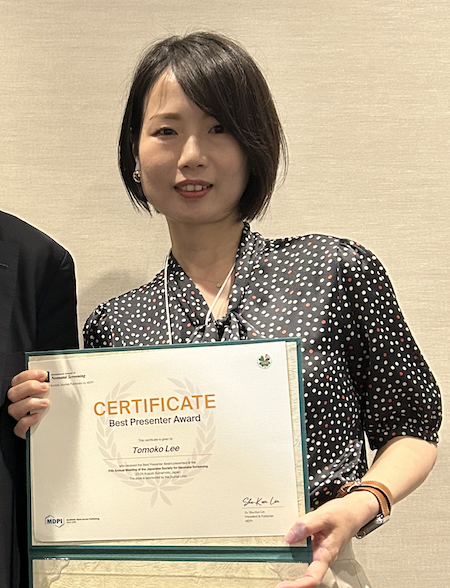10 October 2024
Interview with Prof. Dr. Tomoko Lee—Winner of the IJNS Best Presentation Award 2024
You are accessing a machine-readable page. In order to be human-readable, please install an RSS reader.
All articles published by MDPI are made immediately available worldwide under an open access license. No special permission is required to reuse all or part of the article published by MDPI, including figures and tables. For articles published under an open access Creative Common CC BY license, any part of the article may be reused without permission provided that the original article is clearly cited. For more information, please refer to https://www.mdpi.com/openaccess.
Feature papers represent the most advanced research with significant potential for high impact in the field. A Feature Paper should be a substantial original Article that involves several techniques or approaches, provides an outlook for future research directions and describes possible research applications.
Feature papers are submitted upon individual invitation or recommendation by the scientific editors and must receive positive feedback from the reviewers.
Editor’s Choice articles are based on recommendations by the scientific editors of MDPI journals from around the world. Editors select a small number of articles recently published in the journal that they believe will be particularly interesting to readers, or important in the respective research area. The aim is to provide a snapshot of some of the most exciting work published in the various research areas of the journal.
Original Submission Date Received: .

In collaboration with our affiliated Japanese Society for Neonatal Screening, this year, during the 51st Annual Meeting of the Japanese Society for Neonatal Screening, we presented the IJNS Best Presentation Award to Prof. Dr. Tomoko Lee, and we interviewed her to learn about her experience.
I graduated from Kobe University School of Medicine in 2005 and completed a doctoral program at the Department of Pediatrics at Kobe University Graduate School of Medicine in 2014. Currently, I serve as an associate professor of pediatrics at Hyogo Medical University. My areas of expertise include pediatrics, newborn screening, congenital metabolic disorders, neuromuscular diseases, and genetics.
As a pediatric clinician, I have been involved in newborn screening for about 15 years. The importance of presymptomatic diagnosis through newborn screening has made a strong impression on me, particularly through my experiences treating many patients with congenital metabolic disorders.
The field of newborn screening has been developing rapidly, especially within the last decade. In Japan, newborn screening has expanded and started to include previously untreatable diseases such as spinal muscular atrophy and lysosomal storage diseases.
We introduced the possibility of establishing newborn screening for late-onset proximal urea cycle disorders, through a prospective pilot study in Hyogo Prefecture, focusing on low citrulline levels. Over a period of approximately three and a half years, citrulline values were examined in more than 100,000 newborns, and the background linked to low citrulline values was clarified. In addition, we identified one patient with late-onset carbamoyl phosphate synthetaseⅠ(CPS1) deficiency, which suggested that low citrulline values may be a screening marker.
We are entering an exciting new era in this field, so I strongly encourage young researchers to jump in. Their contributions will be invaluable in the coming years.
I am very happy to receive the Best Presentation Award, as it will keep motivating me for my future research. I think that awards such as the presentation award, article award, and travel award are highly encouraging for young researchers.
